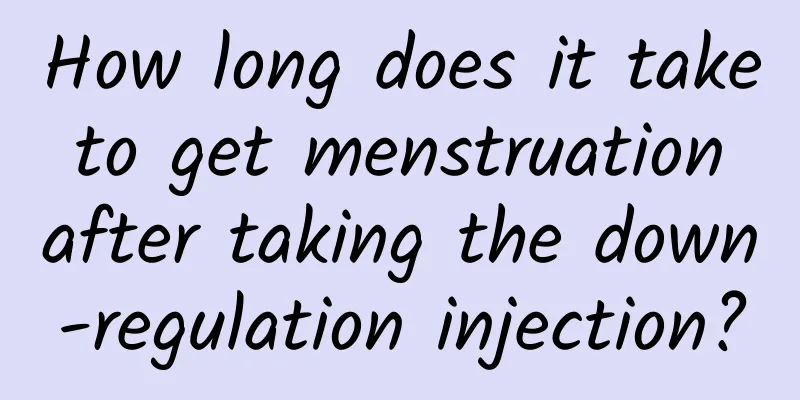How long does it take to get menstruation after taking the down-regulation injection?

|
After the down-regulation injection, menstruation usually comes according to the original cycle, but some women may have a slight delay. Down-regulation injection is mainly used to promote ovarian ovulation and usually does not affect the menstrual cycle. 1. Mechanism of action of down-regulation needle Down-regulation injection is a drug used to promote ovulation by stimulating the ovaries to mature multiple follicles. This can increase the chance of pregnancy, especially when undergoing assisted reproductive technology. Although it affects the activity of the ovaries, it generally does not have a significant impact on the menstrual cycle. Most women will have their menstrual period on time after the injection. 2. The impact of individual differences Everyone has a different body type, so their response to the down-regulation injection may vary. Some women may find that their menstrual cycle is slightly delayed by about a week than usual. This is usually not something to worry about, as in most cases it will not have a long-term effect on future menstrual cycles. 3. Possible pregnancy If menstruation has not occurred for more than a week after the down-regulation injection, the possibility of pregnancy needs to be considered. At this time, it is recommended to go to the hospital for a blood test, such as HCG test, to determine whether pregnancy is present. If the possibility of pregnancy is ruled out, further sex hormone six-item test may be required to rule out other causes such as endocrine disorders. 4. Precautions for drug use When using down-regulation injections and other ovulation-inducing drugs, be sure to do so under the guidance of a doctor. Self-use may lead to ovarian hyperstimulation, abdominal pain or other discomfort. The doctor will adjust the dosage and medication regimen based on individual conditions to ensure safety and effectiveness. 5. Adjustment of lifestyle It is also important to maintain a good lifestyle during the use of down-regulation injections. A reasonable diet, moderate exercise and a good mental state can help the body better cope with the effects of the drug. If any discomfort or concerns arise, it is very necessary to communicate with the doctor in time. 6. Concern about long-term impact Although down-regulation injections generally do not have a long-term effect on future menstrual cycles, if persistent menstrual irregularities or other abnormalities occur after use, you should seek medical attention in a timely manner. The doctor will evaluate and treat the specific situation to ensure the reproductive health of women. By understanding the mechanism of action of down-regulation injections and using them appropriately, you can better manage your menstrual cycle and reproductive health. If you have any questions or discomfort, consulting a professional doctor in a timely manner is the best way to ensure safety and health. |
<<: At what age will menopause occur if only one ovary is left?
>>: Why haven't I had my period for two months?
Recommend
How to provide nursing care for patients with ectopic pregnancy
It is very common for women to have ectopic pregn...
What are the early symptoms of vaginal candidal infection?
There are many types of vaginitis, and each type ...
What is the location of the uterine fibroids and what does the uterine fibroids mean?
What is the location of the uterine fundus wall o...
What should I do if I have pelvic inflammatory disease?
What should you do if you have pelvic inflammator...
Will threatened abortion lead to fetal malformation?
Pregnancy preservation for threatened abortion us...
How much does it cost to hospitalize and preserve the fetus for threatened miscarriage?
Many women may have poor physical fitness, which ...
Dietary precautions after painless abortion
As the phenomenon of unwanted pregnancies increas...
What are the main symptoms of cervical hypertrophy?
Cervical hypertrophy is also a type of gynecologi...
Will cervical warts have an adverse effect on the fetus?
Once you are infected with cervical warts, you sh...
Can I still get pregnant after a miscarriage without a uterine curettage?
Can I still get pregnant after a miscarriage with...
Effects of surgery on Bartholinitis during pregnancy
Will surgery after pregnancy for Bartholinitis af...
Candida vaginitis is not a one-time cure
Ms. Li is a sales lady of a real estate company. ...
Your body shape determines how you exercise! People who are prone to obesity can lose weight by exercising like this
[Body type prone to gaining weight] People with h...
A Grade 3 boy weighed over 100 pounds and almost had a liver failure! Remember the code for healthy postures: "85210"
The problem of obesity in children or adolescents...
How to effectively treat cervical hypertrophy?
How to effectively treat cervical hypertrophy? Ma...









